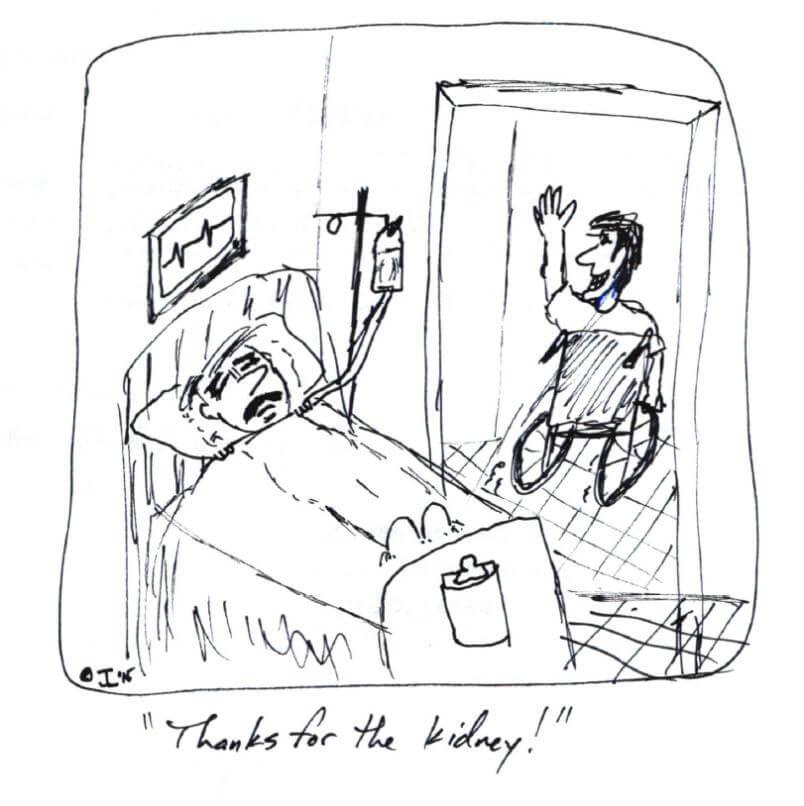Since Thanksgiving a few weeks away, I was thinking about how infrequently we give thanks to the people in our lives. For many families it is tradition to give thanks during the Thanksgiving meal. Some even go around the table and ask everyone to state the things for which they are thankful.
However, it’s not enough to just show appreciation on one day of the year. It’s important that we consistently let others know we’re grateful for the things they do for us, for our employees, for our customers, and for our families.
You may be thinking, “I already do this, I say ‘thanks’ to people multiple times a day,” and you probably do. However, a quick “thanks” said in passing is often inadequate and we could do a lot better. Thanks works great when I’ve passed you the ketchup for your fries, but how would you feel if you donated a kidney to me and all I said was, “Thanks for the kidney, pal.”
A more complete and meaningful “thank you” is necessary for hard work, actions above and beyond the “call of duty”, and definitely when someone donates a body part to you.
To show others appreciation that will make their day, follow these 4 Keys to a Meaningful “Thank You”.
1. Be timely– Say “thank you” on the spot. Don’t wait for a better time because you’ll probably forget.
2. Be specific– Tell the person exactly what he or she did or said that you appreciate.
3. Share the impact– Tell the person WHY their actions were so noteworthy. What was the result or positive consequences of his or her actions? This could be a positive consequence for you, your organization, your employees, customers, or family.
4. Say “thank you” not “thanks”– “Thanks” often comes across as flippant. “Thank you” is more complete. They even sound different when you say them. Don’t believe me, try it. Say “thanks” and then say “thank you”. You’ll probably notice that the latter sounds more sincere. Your voice, facial expressions, and body language will likely sound and look more thankful.
“Cassie, I really appreciate you staying late to help me finish the year-end report. Your focus and attention to detail helped ensure that the report was 100% accurate and allowed me to get the report to the boss on time. Thank you so much for your hard work.”
And a final tip- Although a face-to-face “thank you” is best, it’s also a great idea to provide a “thank you” in writing for those who might need it for support of their performance appraisals. You could also copy their boss on a “thank you” email to ensure he or she knows about the great work the employee did.
It takes less than 30 seconds to make someone’s day with a meaningful “thank you”. Be sure to take every opportunity every day, not just on Thanksgiving, to give sincere thanks to the people who make your life better.
A special thank you to all of my blog readers for being such loyal followers. I love getting your feedback when you read something that helps you improve your communication, overcome challenges, and be more successful. It’s what has made writing this blog not only fun, but so rewarding for the past 10 years.
_________________
Now through December 31, 2021, you can order a signed copy of Amy’s first book “Practical Communication: 25 Tips, Tools, and Techniques for Getting Along and Getting Things Done,” for just $10 plus shipping/packaging. The proceeds from all purchase will be donated in your honor to Starlight Outreach and Rescue, the nonprofit animal rescue organization Amy founded in 2017. Place your order here!








A thank you for a job well done is ALWAYS appreciated. It means alot comig from a supervisor or co-worker. I’ve experienced the same from a lesser known source. I worked as a 911 operator for 30 years. Praise came from the proper chain of command, but a more meaningful experience for me came from the public that I rarely met. Whether it was a box of doughnuts dropped off at the communications center or card in the mail addrressed to “the dispatchers” (because people really don’t know our names) it always touched me so deeply. They don’t even know what we do behind the scenes, but “they know” , and make the effort to acknowledge us. Frequently this is more potent that a “good job” from a boss.